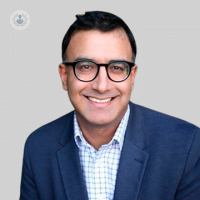ACL reconstruction: your all-you-need-to-know guide
Written in association with:An anterior cruciate ligament (ACL) reconstruction is performed in order to replace one's torn anterior cruciate ligament and is a hugely common injury sustained by sports athletes. In our latest article, London and Beckenham-based consultant orthopaedic surgeon, Mr Shahid Punwar, explains how a patient is typically tested following the procedure to determine whether or not they are fit enough to return to sport.

What is the average recovery like after an ACL reconstruction?
We normally perform ACL reconstruction as a day-case procedure and we give local anaesthetic around the knee, so patients can actually go home the same day. The knee will be a little swollen and sore following the surgery, but by two weeks, patients will notice that the swelling will have come right down.
Usually, patients engage in physiotherapy throughout this initial two-week recovery period, and it’s at this stage that they really start to make progress. By six weeks – which is when an ACL patient will normally be seen again by their surgeon – swelling should be completely down and patients should be getting full extension of the knee, being able to straighten the knee. Then, six weeks later (a three-month recovery period in total), patients will be walking normally again and there is no swelling left in the knee.
When is it safe to return to sport after having an ACL reconstruction procedure?
This depends entirely on the sport. We receive many young patients in particular who regularly play pivoting sports (side to side movement, with lots of change in speed and direction) and particularly if it is a contact sport, such as football or rugby, we are talking at least nine to 12 months.
I would generally recommend that patients start jogging after three months, but we want that new ligament to really heal into the patient’s bone because what we are doing, is we are taking a part of a tendon and are putting it through the shinbone and the thighbone. So, it takes about nine to 12 months for it to really heal properly.
What are the criteria for an ACL reconstruction patient to return to sport?
I think patients need to have a stable, strong, pain-free knee, a good range of motion, and good muscle control. There is, of course, a potential difficulty to return to sport and we do have to warn people that they might not get back to the same exact level that they were at before.
A physiotherapy programme will need to be followed. Once the physiotherapist is happy and the patient has made it through all the stages involved in the physiotherapy process, then they will be able to return to sport.
How is a patient tested after having the procedure to know if they can return to sport?
It depends on the sport and how they get on with the physiotherapist. The patient needs to be compliant with their instructions and the physiotherapist. Then, there is the surgeon doing their job, performing a technically correct procedure, but the majority of effective rehabilitation is thanks to a good physiotherapy team.
ACL physiotherapy is quite specific and the closer the patient gets to full recovery (around the 8/9-month mark), the patient – if a sportsman or sportswoman, will start to engage in sport-specific drills and exercises and when their muscle strength is equal on both sides, and the range of motion is equal on both sides, and if the patient can really feel their knee changing direction, then I think they are ready.

What percentage of patients who return to sport after the procedure suffer from a second ACL injury, and why might this be?
It’s difficult to put an exact number on it because there are so many different factors. The most important thing to think about are the patients’ risk factors when it comes to returning to sport.
There are also gender influences. So, unfortunately, females have a higher risk of rupture compared to males due to gender-specific anatomy differences, ligaments tend to be slightly looser, and particular anyone who has hypermobility is at slightly a higher risk of experiencing re-rupture.
The younger you are, the greater risk of re-rupture as you generally have more time to play the sport you love, and unfortunately then there is a greater risk of injury.
Mr Shahid Punwar is a highly experienced consultant orthopaedic surgeon who specialises in ACL reconstruction, amongst many other orhopaedic-related conditions. If you are considering undergoing an ACL reconstruction, you can consult directly with Mr Punwar by visiting his Top Doctors profile.



